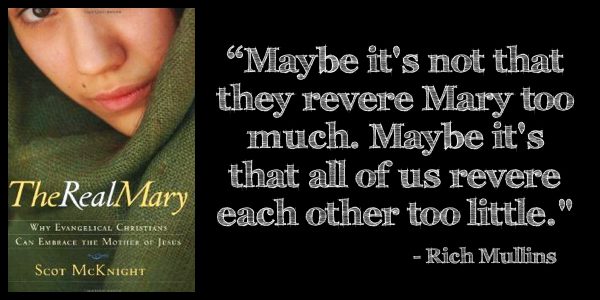 It’s become a tradition at my church to spend one Sunday talking about Mary each year during advent. For protestants in general, and evangelicals in particular, Mary has been avoided like the plague. If we talk about Mary at all our tendency is to either sentimentalize her, thereby taking away her toughness, or we confine her to the Christmas story and a much smaller role than the New Testament itself warrants. Either way, the role that Mary should play in our life and worship is diminished.
It’s become a tradition at my church to spend one Sunday talking about Mary each year during advent. For protestants in general, and evangelicals in particular, Mary has been avoided like the plague. If we talk about Mary at all our tendency is to either sentimentalize her, thereby taking away her toughness, or we confine her to the Christmas story and a much smaller role than the New Testament itself warrants. Either way, the role that Mary should play in our life and worship is diminished.
As I prepare to talk about Mary each year, one of the resources that I’ve grown to trust is Scot McKnight’s book The Real Mary. In in McKnight insists that for non-Catholics and Catholics alike, “The story about the real Mary has never been told. The Mary of the Bible has been hijacked by theological controversies whereby she has become a Rorschach inkblot in which theologians find whatever they wish to find. In the midst of this controversy, the real Mary has been left behind.” (Ch.1).
I reached out to Scott this week to ask him if, in nearly a decade since he wrote his book on Mary, he’s seen any significant change in the way Mary is viewed by the church. His response was interesting. He said,
“What has been very disappointing to me is that apart from a few most evangelicals still don’t care. I tried to awaken folks to an evangelical approach — biblical to the core as I sought to turn the narratives into a story that made sense of her life and development — but the anti-Catholicism of so many just blocks interest in her. We miss out by not seeing her one of our models/examples of discipleship.”
I couldn’t agree more.
That quote alone would’ve been worth the email, but then McKnight dropped his bomb on me, and it has been working me over since I read it last night. He said,
“Mary and Joseph began to suffer for Jesus before he was even born—that in itself is worth knowing and contemplating.”
Mary was the first to suffer for Jesus. She and Joseph bore the brunt of social pressures and shame that most of us cannot fathom. This is the kind of deep insight into the life of Mary most of us are lacking because we don’t take Mary seriously enough.
I never set out to become a raving fan of Jesus’ mother. Like most protestant Christians I was born and bred to maintain a deep suspicion of the peculiar role she plays within the Roman Catholic tradition. My perspective began to change, strangely enough, because of Rich Mullins, who has had (and continues to have) such a profound influence on me. Rich helped me to loosen up about Catholicism in general, and about Mary in particular. He was fond of saying,
“People worry with the Catholic thing of revering Mary, and I’ve often thought… maybe it’s not that they revere Mary too much. Maybe it’s that all of us revere each other too little.”
What I think he meant was that Mary showed us what is possible in our own lives if we will have the courage to repeat her line, “May it be unto me according to your word.” We spend far too much time finding ways to denigrate and oppose other people’s means of following Jesus because they are strange to us. Mary teaches us that we need to learn how to make space for diverse forms of obedience to the same gospel. Nobody has a corner on the Jesus market. She teaches us to have reverence for the kingdom possibilities each and every life we come in contact with represents.
Another great resource on Mary is a book called Mary, Mother of God, by Carl Braaten and Robert Jensen. Jenson has also had a profound impact on my thinking about Mary, particularly in two areas: First, Mary is the most important prophet in the New Testament apart from Jesus. In the Old Testament a prophet is defined as a person who has been joined to the word of God so fully, that they actually bring forth the very word of God to the people. Mary was overshadowed by the Holy Spirit—fully joined to the word—and then brought forth that word to the wider world by word (especially her song), deed (a life of obedience and suffering), and physically giving birth to the word made flesh. The second is that, because of her being joined to the Holy Spirit, Mary is the first charismatic in the New Testament.
One last thought from Scot Mcknight. I asked if his thinking on Mary had changed or developed since writing the book, and I thought his answer was interesting.
“I’ve not done any more intense work or read any new book on Mary, so I’ve not really changed or even developed—except I see her in places as I’m teaching and preaching and reading where many don’t. She’s with me for the rest of my life. (Or I’m with her.)”
That’s one of the real gifts of spending some quality time with The Real Mary. Once you consent to taking Mary’s influence on Jesus and the early church seriously, you can see it happening where others miss it. I love this juxtaposition of she’s with me v. I’m with her. I’m grateful to have this week to focus on Mary, her influence on Jesus and the early church, her powerful example, her radical faith, and supernatural resolve. I would consider myself incredibly blessed to be able to say, “I’m with her.”













